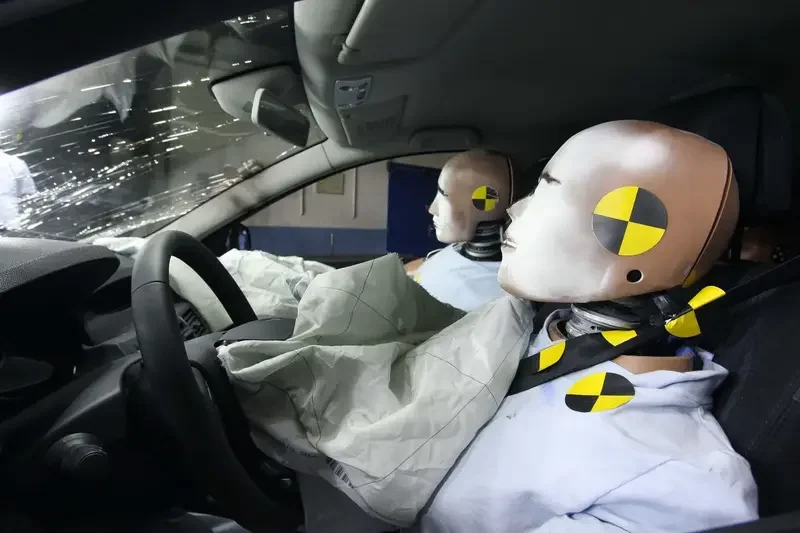The Ticking Time Bomb: Ammonium Nitrate's Fatal Flaw
The core technical failure of Takata airbags stemmed from the chemical instability of its chosen propellant, phase-stabilized ammonium nitrate (PSAN). Critically, Takata formulated this propellant without a desiccant, a drying agent used by competitors to absorb ambient moisture. This omission proved catastrophic.
Over years of exposure to high heat and humidity, the PSAN wafers underwent significant degradation. Moisture intrusion and thermal cycling caused the solid propellant tablets to break down, crumbling into a fine powder. This physical change dramatically increased the propellant's surface area, altering its burn rate. Upon deployment, the ignition of this powdered PSAN resulted in an uncontrolled, explosive combustion event rather than the intended rapid but controlled inflation.
The immense, instantaneous pressure generated by this explosion far exceeded the structural tolerance of the metal inflator canister, causing it to rupture violently. The shattered canister became lethal shrapnel, propelled directly into the vehicle's cabin at high velocity, posing a severe risk of injury or death to occupants.
This fundamental design flaw precipitated the largest and most complex automotive recall in history. The crisis ultimately affected over 100 million vehicles across more than 30 global automotive brands, leading to numerous fatalities and injuries worldwide and forcing Takata Corporation into bankruptcy in 2017.
France at the Epicenter: The 2025 'Stop Drive' Mandate
The crisis escalated dramatically in France in June 2025 when the government ordered an additional 800,000 vehicles to be immobilized. This action expanded the mandatory 'stop drive' mandate to 1.7 million vehicles, out of 2.5 million total recalled in the country. The catalyst for this decisive measure was the death of a driver in Reims on June 11, 2025, whose 2014 Citroën C3 was equipped with a defective Takata airbag.
According to the French Ministry of Transport, this incident raised the nationwide toll to 18 deaths and 25 injuries. Official statistics underscore the disproportionate danger in hotter, more humid climates, with 16 of the 18 fatalities occurring in France's overseas territories. The expanded 'stop drive' order now applies to all affected vehicle models in Corsica and the overseas territories. In mainland France, the immobilization mandate covers all affected models manufactured prior to 2011.

A Cascade of Failures: Unpacking the Chain of Responsibility
The crisis persisted for over a decade due to profound systemic failures in both corporate and regulatory oversight. The response was dangerously fragmented and delayed. While some manufacturers, like Toyota, initiated recalls as early as 2013, others acted with alarming slowness. Stellantis, for instance, only issued its critical recall for Citroën C3 and DS3 models in May 2024, more than ten years after the initial warnings. This inconsistent approach left millions of drivers unknowingly exposed to lethal risks.
The regulatory framework proved equally ineffective. In France, the consumer association UFC-Que Choisir condemned the government's handling of the escalating crisis as "total improvisation." The group demanded a formal investigation into the "entire chain of responsibility," from manufacturers to state authorities, to understand how the situation was allowed to deteriorate. This call for accountability, however, was met with institutional resistance.
Critically, in the spring of 2025, the French National Assembly rejected a proposal by deputy Karine Lebon to establish a parliamentary commission of inquiry into the state's management of the affair. This refusal to investigate underscored a significant breakdown in political oversight, shielding both corporate and governmental actors from scrutiny. The combination of slow corporate action and weak regulatory enforcement created a vacuum of responsibility, ultimately prioritizing bureaucratic inertia over public safety. The decade-long delay was not merely a technical issue but a catastrophic failure of governance.
Navigating the Fallout: Regulatory Fixes and Owner Imperatives
In response to these systemic failures, the French government is shifting focus to future prevention and immediate owner support. Transport Minister Philippe Tabarot is now advocating for stricter, harmonized EU-wide homologation standards to ensure airbag safety is rigorously enforced across the bloc, preventing a similar crisis from recurring.
To address the immediate disruption, a forthcoming government decree will introduce binding obligations for manufacturers. This measure will compel automakers to provide a courtesy vehicle or cover rental car expenses for any owner whose vehicle is under a mandatory 'stop drive' order. The decree will also establish firm deadlines for the completion of repairs and require manufacturers to maintain a minimum inventory of replacement airbags to eliminate supply chain bottlenecks and accelerate the recall process.
For vehicle owners seeking to determine their status, the government has launched a dedicated online portal: www.ecologie.gouv.fr/rappel-airbag-takata. By entering their vehicle's 17-character Vehicle Identification Number (VIN)—found on the registration document (carte grise) or at the base of the windshield—drivers can instantly verify if their car is affected.
Crucially, compliance with 'stop drive' orders is not merely a safety recommendation but a matter of legal and financial liability. Owners who have been notified but continue to operate a vehicle under such a mandate risk severe consequences. Insurers have indicated that in the event of an accident, indemnification for damages may be significantly reduced or even refused, leaving the non-compliant owner financially responsible.
